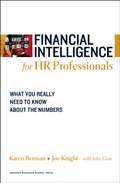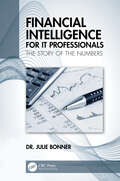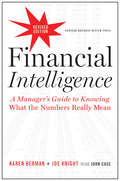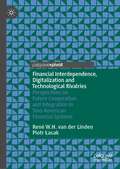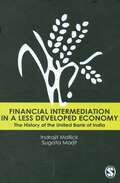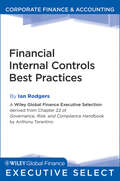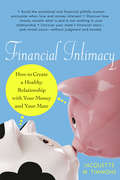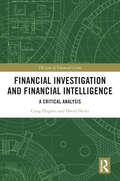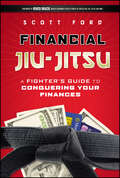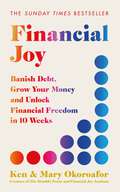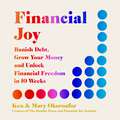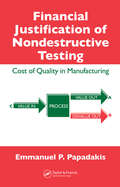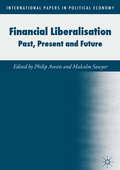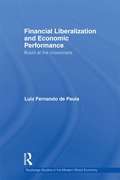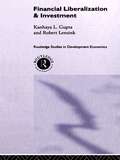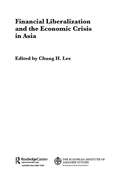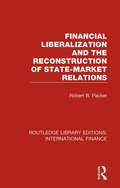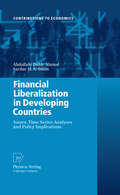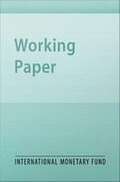- Table View
- List View
Financial Intelligence for HR Professionals
by John Case Karen Berman Joe KnightAs an HR manager, you're expected to use financial data to make decisions, allocate resources, and budget expenses. But if you're like many human resource practitioners, you may feel uncertain or uncomfortable incorporating financials into your day-to-day work.Using the groundbreaking formula they introduced in their book Financial Intelligence: A Manager's Guide to Knowing What the Numbers Really Mean, Karen Berman and Joe Knight present the essentials of finance specifically for HR experts.Drawing on their work training tens of thousands of managers and employees at leading organizations worldwide, the authors provide a deep understanding of the basics of financial management and measurement, along with hands-on activities to practice what you are reading. You'll discover:· Why the assumptions behind financial data matter· What your company's income statement, balance sheet, and cash flow statement really reveal· Which financials may be needed when you're developing a human capital strategy· How to calculate return on investment· Ways to use financial information to better support your business units and do your own job· How to instill financial intelligence throughout your teamAuthoritative and accessible, Financial Intelligence for HR Professionals, empowers you to "talk numbers" confidently with your boss, colleagues, and direct reports -- and understand how the financials impact your part of the business.
Financial Intelligence for IT Professionals: The Story of the Numbers
by Julie BonnerThere are many books written for the accounting and finance community. However, there are very few books written to help the non-financial career professionals who still need to understand the conceptual fundamentals of accounting and finance. In 20 years of teaching this material to non-financial professionals, Dr. Bonner has perfected a teaching approach that works to help the non-financial professional engage with the material to use financial information in leveraging their career without becoming overloaded with information that is not helpful to them. Learning this material takes repetition, application, and building the thinking processes necessary for effectiveness. Many think the challenge with finance is the math, but as this book will demonstrate, it is a conceptual problem. If you understand the conceptual framework, you will understand the math. Dr. Julie Bonner is currently a tenured professor at Central Washington University in the information technology and administrative management department. Her career has spanned business and education for over 30 years. Initially, she received a Bachelor of Science degree in accounting, whereafter she earned an MBA and then a doctorate in organizational leadership.
Financial Intelligence, Revised Edition
by John Case Karen Berman Joe KnightInc. magazine calls it one of "the best, clearest guides to the numbers" on the market. Readers agree, saying it's exactly "what I need to know" and calling it a "must-read" for decision makers without expertise in finance.Since its release in 2006, Financial Intelligence has become a favorite among managers who need a guided tour through the numbers-helping them to understand not only what the numbers really mean, but also why they matter. This new, completely updated edition brings the numbers up to date and continues to teach the basics of finance to managers who need to use financial data to drive their business. It also addresses issues that have become even more important in recent years-including questions around the financial crisis and those around broader financial and accounting literacy.Accessible, jargon-free, and filled with entertaining stories of real companies, Financial Intelligence gives nonfinancial managers the confidence to understand the nuance beyond the numbers-to help bring everyday work to a new level.
Financial Interdependence, Digitalization and Technological Rivalries: Perspectives on Future Cooperation and Integration in Sino-American Financial Systems
by Piotr Łasak René W.H. van der LindenThis Palgrave Pivot investigates how the Chinese and United States financial systems are becoming increasingly interdependent, in spite of a simultaneous technological rivalry and ‘decoupling’ between the two nations. The book offers a comparative analysis of Sino-US financial systems before and after the global financial crisis of 2008-2009, demonstrating the deepening integration of China into global financial markets and its move from an indirect bank-based system towards a direct market-oriented system. It discusses the economic and technological competition that has arisen between the US and China, the two largest financial centers based on financial technology, and demonstrates the differences in national interest driving processes of digitalization and FinTech applications. At the same time, the book points to ways in which a market-oriented global financial system and the rapid international growth of financial technology make future cooperation inevitable and necessary. This book places Sino-US financial relations in a broader financial-economic perspective and will be of interest to academics, consultants and students working in banking and finance, international financial markets, comparative economics, monetary theory and Chinese business studies.
Financial Intermediation in a Less Developed Economy: The History of the United Bank of India
by Sugata Marjit Indrajit MallickFinancial Intermediation in a Less Developed Economy: The History of the United Bank of India is an institutional narrative of a bank in a developing economy, a representative case study that brings out the essential two-way relationship between finance and economic development. The book highlights that to understand financial intermediation, western theoretical models need to be complemented with institutional narratives of banking in developing economies, given the latter`s specific foci. Thus, the authors choose a bank with significant history in a less developed economy and analyze over 50 years of the bank`s balance sheet data. They trace the bank`s growth in terms of the transaction costs in managing risk, return and liquidity. The discourse also includes important case studies of borrowers after nationalization, a thorough analysis of financial intermediary organization and financial structure, reviews of certain banking policies and suggestion of a methodology to understand the financial history of less developed economies. This book will be of immense interest to policy makers, researchers and students working in the fields of economics of banking, financial history and development economics.
Financial Intermediation, Competition, and Risk: A General Equilibrium Exposition
by Gianni De Nicolò Marcella LucchettaA report from the International Monetary Fund.
Financial Internal Controls Best Practices (Wiley Global Finance Executive Select #1)
by Anthony TarantinoThis chapter from Governance, Risk, and Compliance Handbook, edited by Anthony Tarantino, provides an overview of best practices for financial internal controls. It covers COSO II guidance, automation of controls, and other primary considerations. It also discusses how to achieve ROI on compliance investments.
Financial Intimacy: How to Create a Healthy Relationship with Your Money and Your Mate
by Jacquette TimmonsAddressing the common reasons people don't discuss personal finances in detail and in-depth with their partner, this unique approach to managing money goes beyond the superficial to the substantial and significant conversations couples should have about money. In part one, personal profiles of 19 women reflect the financial and emotional challenges every woman, to some degree, eventually faces when the relationships she has with herself, her money, and her mate converge. The second section reviews key individual thoughts, behavior, and expectations concerning money and examines how these affect the expectations of a significant other. The love-and-money dance is the focus of the third part, providing a framework for asking questions and exchanging information that allow any couple to know and understand each other's personal financial history. Assessing and improving the emotional impact of managing money in a romantic relationship, this guidebook elevates the conversation about money and provides women with the tools to take the lead.
Financial Investigation and Financial Intelligence: A Critical Analysis (The Law of Financial Crime)
by Craig Hughes David HicksThis book critically analyses the conceptual understanding of financial investigation and financial intelligence among UK law enforcement authorities and their commentators. The work provides a critical review of financial investigation, including international standards, and how it is perceived and applied by law enforcement agencies. It adopts the position that financial investigation is an evidence-gathering process and not simply related to asset recovery. Here, the concept of “following the money” is superseded by the wider approach of “following the financial footprint” by generalist and specialist investigators and analysts. The book focuses on identifying the financial footprint as a skill set for routine investigation application inclusive of the emerging threat posed by the digital environment, including cryptocurrencies. It assesses the terminology, typologies and structures associated with the subject area at the national and international levels. It also examines the historical trajectory of financial investigation to understand current perceptions of it within law enforcement, among government ministers and policy makers. The book will be of interest to students, academics and policy makers internationally working in the areas of criminal law, criminology and finance.
Financial Jiu-Jitsu
by Scott FordA unique approach to personal finance that tackles money like a jiu-jitsu fighter would tackle an opponentIn martial arts and personal finance, fundamentals are important. But while failing in Brazilian Jiu-Jitsu may be disappointing, it's nothing compared to failing to build wealth and creating a better future for your family.Nobody understands this better than Scott Ford, a top-ranked financial advisor and Jiu-Jitsu enthusiast. Now, in Financial Jiu-Jitsu, he shows you how to overcome your emotions and state of mind to excel at your investing endeavors. Along the way, Ford teaches you fundamental skills such as automating your savings and investments, the importance of paying yourself first, and managing credit wisely.Compares the patience and practice of the martial arts, specifically Jiu-Jitsu, to investingOffers an approach to adapting to financial change as you move through life, while maintaining the same guiding principlesAuthor Scott Ford is ranked in the top one percent of all financial advisorsThe guiding principles in this book are the foundation of your financial fight plan and the keys to reaching your financial dreams. No matter what punches the market or the economy throws at you, if you follow these principles you'll always react well in the face of adversity.
Financial Joy: Banish Debt, Grow Your Money and Unlock Financial Freedom in 10 Weeks
by Ken Okoroafor Mary OkoroaforAs seen on ITV's This Morning! A life-changing 10-week plan to help you to turn your life around and design a path to financial freedom, enriched with the small experiences that bring you joy.Stop worrying about money. Start enjoying your life.You might be struggling in debt, living paycheque to paycheque, or worried about preparing for retirement; maybe you're considering your first investment, or you just want an escape plan from the '9 to 5'. Wherever you are on your journey, this book will revolutionize your lifestyle and your relationship with money. Authors Ken and Mary Okoroafor started out as resource-poor, working-class immigrants and have built a life of financial independence and joyful moments through hard work, smart saving and savvy investing. They know what it feels like to start from ground zero, and as a chartered accountant and former CFO, Ken shares his financial expertise to help you unlock the secret to building wealth.You'll learn how to take control of your finances, develop good money habits, become debt-free, invest in assets and multiply your income so you can create the freedom to travel, spend time with your loved ones and plan for a stress-free (early) retirement - all whilst prioritising your wellbeing and having fun!It also includes a dozen real-life interviews with singles, couples and those with children, from different backgrounds, age groups and stages of their money journey, including a few well-known public figures.Financial joy can be achieved by anyone - and it can start today, not tomorrow.'The book that's been missing from this genre. A joy to read and learn from.' -- Cait Flanders, bestselling author of THE YEAR OF LESS and ADVENTURES IN OPTING OUT'A book to savour' - JL Collins, author of the international bestseller The Simple Path to Wealth'The most joyful money book out there' - Selina Flavius, author of Black Girl Finance
Financial Joy: Banish Debt, Grow Your Money and Unlock Financial Freedom in 10 Weeks
by Ken Okoroafor Mary OkoroaforAs seen on ITV's This Morning! A life-changing 10-week plan to help you to turn your life around and design a path to financial freedom, enriched with the small experiences that bring you joy.Stop worrying about money. Start enjoying your life.You might be struggling in debt, living paycheque to paycheque, or worried about preparing for retirement; maybe you're considering your first investment, or you just want an escape plan from the '9 to 5'. Wherever you are on your journey, this book will revolutionize your lifestyle and your relationship with money. Authors Ken and Mary Okoroafor started out as resource-poor, working-class immigrants and have built a life of financial independence and joyful moments through hard work, smart saving and savvy investing. They know what it feels like to start from ground zero, and as a chartered accountant and former CFO, Ken shares his financial expertise to help you unlock the secret to building wealth.You'll learn how to take control of your finances, develop good money habits, become debt-free, invest in assets and multiply your income so you can create the freedom to travel, spend time with your loved ones and plan for a stress-free (early) retirement - all whilst prioritising your wellbeing and having fun!It also includes a dozen real-life interviews with singles, couples and those with children, from different backgrounds, age groups and stages of their money journey, including a few well-known public figures.Financial joy can be achieved by anyone - and it can start today, not tomorrow.'The book that's been missing from this genre. A joy to read and learn from.' -- Cait Flanders, bestselling author of THE YEAR OF LESS and ADVENTURES IN OPTING OUT'A book to savour' - JL Collins, author of the international bestseller The Simple Path to Wealth'The most joyful money book out there' - Selina Flavius, author of Black Girl Finance
Financial Joy: Banish Debt, Grow Your Money and Unlock Financial Freedom in 10 Weeks - INSTANT SUNDAY TIMES BESTSELLER
by Ken Okoroafor Mary OkoroaforTHE INSTANT SUNDAY TIMES BESTSELLERAs seen on ITV's This Morning! A life-changing 10-week plan to help you to turn your life around and design a path to financial freedom, enriched with the small experiences that bring you joy.Stop worrying about money. Start enjoying your life.You might be struggling in debt, living paycheque to paycheque, or worried about preparing for retirement; maybe you're considering your first investment, or you just want an escape plan from the '9 to 5'. Wherever you are on your journey, this book will revolutionize your lifestyle and your relationship with money. Authors Ken and Mary Okoroafor started out as resource-poor, working-class immigrants and have built a life of financial independence and joyful moments through hard work, smart saving and savvy investing. They know what it feels like to start from ground zero, and as a chartered accountant and former CFO, Ken shares his financial expertise to help you unlock the secret to building wealth.You'll learn how to take control of your finances, develop good money habits, become debt-free, invest in assets and multiply your income so you can create the freedom to travel, spend time with your loved ones and plan for a stress-free (early) retirement - all whilst prioritising your wellbeing and having fun!It also includes a dozen real-life interviews with singles, couples and those with children, from different backgrounds, age groups and stages of their money journey, including a few well-known public figures.Financial joy can be achieved by anyone - and it can start today, not tomorrow.'The book that's been missing from this genre. A joy to read and learn from.' -- Cait Flanders, bestselling author of THE YEAR OF LESS and ADVENTURES IN OPTING OUT'A book to savour' - JL Collins, author of the international bestseller The Simple Path to Wealth'The most joyful money book out there' - Selina Flavius, author of Black Girl FinanceSunday Times Bestseller No.6 in Paperback Non-fiction April 2024
Financial Justification of Nondestructive Testing: Cost of Quality in Manufacturing
by Emmanuel P. PapadakisDemonstrating how to apply financial formulas to prove or disprove the utility of 100% Nondesctructive testing (NDT), this book helps readers build the financial case for their NDT projects. It not only explains how 100% inspection by high-tech methods can save money for a manufacturing organization, but also how to justify this cost. Providing examples of successful NDT implementation drawn from factory situations, the author describes high-tech inspection technology in the context of modern ISO Quality Standards, TQM theory, and Statistical Process Control. Placing NDT in the historical context of quality and inspection, the book provides three methods of calculation for proving its validity.
Financial Leverage, the Capital Asset Pricing Model and the Cost of Equity Capital
by David W. Mullins Jr.Demonstrates how the capital asset pricing model can be used to estimate the impact of financial leverage on the cost of equity capital. The levering and unlevering of betas are illustrated. Also presents a methodology for decomposing the cost of equity into its three components--the risk-free rate, a premium for business, and a premium for financial risk.
Financial Liberalisation
by Philip Arestis Malcolm SawyerThis book is the thirteenth volume in the International Papers in Political Economy (IPPE) series which explores the latest developments in political economy. A collection of eight papers, the book concentrates on the deregulation of domestic financial markets and discusses financial liberalisation in terms of its past performance, current progress and future developments. The chapters have been written by expert contributors in the field and focus on topics such as past records of financial liberalisation, future policies of regulation, and current account imbalances. Other papers examine capital account regulations in developing and emerging countries, and capital controls in the Eurozone after the 2007 financial crisis. This collection of papers invites readers to consider the impact of financial liberalisation both during and after the global economic crisis. Scholars and students with an interest in political economy, financialisation, and economic performance will find this collection stimulating and informative.
Financial Liberalization and Economic Performance: Brazil at the Crossroads (Routledge Studies In The Modern World Economy Ser. #85)
by Luiz Fernando de PaulaSince the beginning of the 1990s, Brazil has followed a pattern of economic development inspired by Washington Consensus. This framework includes a set of liberalising and market friendly policies such as privatisation, trade liberalization, stimulus to foreign direct investment, tax reform, and social security reforms. This book assesses the determinants and impacts of financial liberalisation in Brazil considering its two dimensions: the opening up of the balance of payments capital account, and the penetration by foreign bank of the domestic banking sector. The author combines theoretical and empirical analyses. Some make use of mathematical models and/or statistical techniques; however, they are only used when they are strictly necessary to the analysis.
Financial Liberalization and Financial Fragility*
by Enrica Detragiache Ash Demirgüç-KuntA report from the International Monetary Fund.
Financial Liberalization and Investment (Routledge Studies In Development Economics Ser.)
by Kanhaya Gupta Robert LensinkFor two decades thinking on economic policy has been dominated by the idea of economic liberalization in general and financial deregulation in particular. This field has become both extensive and controversial, yet there is no single book which treats financial deregulation in a complete and coherent manner. This book rectifies the shortfall by foc
Financial Liberalization and the Economic Crisis in Asia (European Institute of Japanese Studies East Asian Economics and Business Series)
by Chung H. LeeWhat brought about a financial crisis in the "miracle" economies of Asia? What went wrong with financial reform in Asia? What can the developing countries of the world learn from the reform experiences in Asia?Financial Liberalization and the Economic Crisis in Asia analyses how financial liberalization was undertaken in eight Asian countries and how it might be linked to the subsequent crises. The country studies focus on China, India, Indonesia, Japan, Malaysia, the Philippines, South Korea and Thailand.
Financial Liberalization and the Reconstruction of State-Market Relations (Financial Sector of the American Economy)
by Robert B. PackerIn this study, the author hopes to add to the literature concerning the distributional consequences of financial integration by focusing on the rise of non-state actors within a transformed international system. In it, he argues that structural change brought on by transnational production and post-industrialization has created space for non-state actors to acquire autonomy from sovereign entities. While finance is by no means the only specialized sector to achieve autonomy, it has perhaps the most immediate impact on the ability of governments to pursue policy. First published in 1999. Routledge is an imprint of Taylor & Francis, an informa company.
Financial Liberalization and the Reconstruction of State-Market Relations (Routledge Library Editions: International Finance #4)
by Robert B. PackerThe central theme of this study, first published in 1998, is that parametric change has expanded the autonomy of non-state actors, and has reduced the capability of governments to extract involuntary resources from their constituents. This change has profound consequences for world politics. This title will be of interest to students of Finance and Economics.
Financial Liberalization in Developing Countries
by Abdullahi Dahir Ahmed Sardar M. IslamThe latest global financial and economic crisis of 2008 has shown the need to re-examine the desirability of financial liberalization. This book is undertaking such a study on the issue of financial and market liberalization by adopting sophisticated econometric methods. It examines the effects of financial liberalization on economic development and social welfare using a case study approach on a sample of three Sub-Saharan African and an Asian country in which financial liberalization reforms were implemented. Further, it highlights some key causes of the failure of reform, and the policies and institutions that are needed to create an environment for successful financial liberalization. From the detailed country assessments, various policies such as effective competition in the banking sector, sound legal system, fiscal discipline and financial institutional development are identified, adoption of which can improve the efficiency of resource allocation, boost savings and impact growth, and thus lead to welfare enhancement.
Financial Liberalization, Money Demand, and Monetary Policy in Asian Countries
by Robert Corker Wanda TsengThis study examines the financial reforms undertaken by nine Asian countries in the 1980s (Indonesia, Korea, Malaysia, Myanmar, Nepal, the Philippines, Singapore, Sri Lanka, and Thailand) and their implications for money demand and monetary policy.
Financial Liberalization, Structural Change, and Real Exchange Rate Appreciations
by Carlos Urrutia Felipe MezaA report from the International Monetary Fund.
